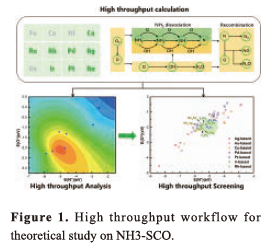Bin Shan1*, Jiaqiang Yang1, Yanwei Wen1, Rong Chen1
1Huazhong University of Science and Technology, Wuhan 430074, Hubei, China
EXTENDED ABSTRACT: Ammonia (NH3) Selective catalytic oxidation of ammonia (NH3-SCO) to innocuous N2 and H20 is considered as the key enabling technology for ammonia removal and the metallic catalysts with superior cataly tireactivity and selectivity become the research focus. Despite the considerable experimental and theoretical explorations and progresses to date, there still seem to be a gap in the understanding of dictating factors and their relationship to the NH3-SCO activity and selectivity for metal catalysts. It is highly desirable to nail down the inherent laws and guiding principles for developing novel NH3-SCO catalystswith superior NH3 conversion ability and selectivity to dinitrogen(N2) in the low temperature (150~400°C). In our work, Firstly, awork flow is developed for high through calculation of complexcatalytic reaction processes. Based that, the complete ammoniaselective oxidation process is demonstrated on the low-index facets of representative metals, and catalytic performance of different metallic catalysts are evaluated quantitatively through microkinetic method, It is revealed that binding ability of N and 0 atoms could be used as effective descriptors of catalytic performancearising from the existence of linear scaling relations among surface adsorbates. The ruling laws of catalytic performance state that moderate N binding energy (-5.00--4.00 eV) exhibit the most favorable catalytic activity, on top of which strengthened binding could further promote N2 selectivity. Based the guiding principles, a series of alloy systems are batch screened and some potential catalysts with good activity and selectivity are proposed. Our study lays out a general theoretical frameworkfor the design of metallic catalysts and their property tuning for NH3-SCO Keywords: microkineics; NH3-SCO: metallic catalysts; descriptor;


Shan Bin, a professor and doctoral supervisor of Huazhong University of Science and Technology, a visiting researcher of Ningbo Institute of Materials, Chinese Academy of Sciences. He has published more than 150 papers and more than 20 authorized invention patents and won the Special Gold Award of Geneva International Invention Exhibition, the first prize of technological invention in Hubei Province, the second prize of Science and Technology of China rare Earth Society, the Silver Award of Hubei Patent and other awards. His main research interests: accurate design and controllable preparation of precious metal catalytic materials.